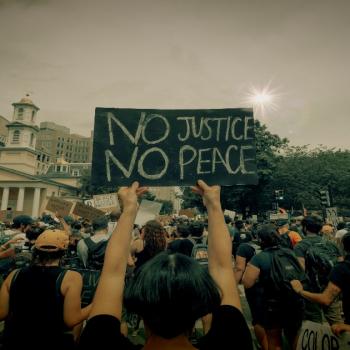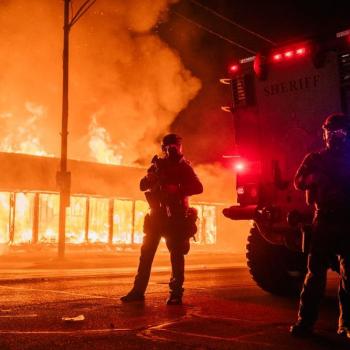As I write this, I wonder if there are topics that are more controversial today than that of the so-called “race-debate.” Here I do not speak merely of the broader cultural movement, but even within the church itself. In my estimation, this will end similarly to how many of the debates within Evangelicalism have over the years, where the existing lines will invariably lead to fractures and splits along those lines. However, what I am curious to see is if the “broad tent” of evangelicalism will survive this simply because the ideas of social justice permeate beyond denominational and theological boundaries. The reason I bring this to the forefront is that we aren’t dealing with men’s and women’s roles within the church as is the debate between complementarianism and egalitarianism, nor are we dealing with ecclesiology as was the debate with the emergent church movement. These movements, I believe, are born out of what we are seeing now—and this goes well beyond our own immediate history to the generations before us who imbibed what was called the social gospel then. That isn’t to say that all proponents of social justice embrace the key tenets of the social gospel, however, I do believe it is a direct result of this earlier movement, as some underlying assumptions are the same.
The reason I say this is that what we are dealing with today is a debate over the substance of the gospel itself. The fundamental question that I believe is being asked in all of this is what the gospel actually is. Is the gospel confined to that which the apostle Paul calls of “utmost importance” as laid out in 1 Cor. 15:3-4, or is the gospel more broadly defined so as to include all of the trappings that come with legitimate faith (i.e. what I would call the “effects of the gospel”)? Is the gospel defined by the indicative (the declaration of facts) or does it include the imperative (the commands given in light of those facts)? Is the gospel the means by which racial reconciliation is already had and realized through the cross, or are there other means by which we can [sic] more effectively treat the issues at hand through behavioral modification? This is perhaps the point of contention behind much of the current debate within Evangelical circles, one I might add tends to fall outside of the purview of many “entering into” the discussion on race within the church. The reason I say it tends to fall outside of the purview of many is that it often elicits an acknowledgment, but it typically gets subsumed under other important topics involved, and therefore becomes an assumed position people are in agreement upon when they speak of the gospel.
For instance, take the idea of institutional, or systemic racism. While there are varying definitions of the term itself, at the broad level, systemic racism simply refers to the idea that existing power structures (i.e. the government) have procedures and processes (i.e. laws) enshrined that create and perpetuate disadvantages to minorities (i.e. black people), and favor majority races (i.e. white people). Now, this idea is not confined simply to the government, but is representative of American society at large, and undergirds every institution in our culture, making it a culture that by design favors whites as the dominate people group. Thus, if you are white, by “birthright” you have inherited an advantage (i.e. white privilege) over your minority peers when it comes to education, job prospects, marriage, interpersonal relationships, financial outcomes, policing, etc. In other words, your whiteness is woven into every aspect of your life and even though you might be in good standing with your black neighbor, you nonetheless stand at an advantage simply by virtue of being white.
In a plainer sense: if you are white, you have been given a disproportionate opportunity to succeed whereas minority people groups have not. Yet beyond this, you have the dominate culture, and as a result, essentially force others into embracing white culture and forsaking their own cultural heritage. The idea behind this is that while you might not even seek to do it, you naturally embrace the culture that is your own, which by design is an oppressive culture, due to these long-standing systems of oppression in place. These systems have deep roots that go back to chattel slavery and were further entrenched in Jim Crow laws, which intrinsically benefited Anglos and created the advantages we benefit from today. In essence, your family may have never owned slaves, could have been abolitionists, marched with Martin Luther King Jr., and found themselves at virtually every conceivable institutional disadvantage as a minority—and you would still have benefited from systemic racism by virtue of being part of the dominate culture.
Now, my natural desire is to critique and interact with those last two paragraphs, but for the sake of staying on topic: to those who are in favor of social justice and hold that systemic racism continues to this day, this would be considered a gospel issue. To that I simply ask: is there anything that is not a gospel issue? I understand that the point of highlighting this as a “gospel issue” is an attempt to do just that—highlight the issue as one of great importance. It is the same thing most are seeking to do when they say, “Black lives matter.” The overarching goal is not for them to say no other lives matter, but that an emphasis needs to be placed on black lives due to these disproportionate inequalities they believe are enshrined in our culture and the inherent risks of being targeted simply for existing as a minority. I disagree with that propositional claim and that of systemic racism existing today on a fundamental level for various reasons, but the question isn’t if black lives matter and racism exists still today. Of course they do. Everyone should be able to agree to that fact and I believe that by and large, most do. The only people who don’t ascent to the truth that people of various ethnicities are image-bearers who deserve equal dignity, are those who embrace a worldview opposed to any basic sense of human decency and especially the Christian worldview. Likewise, any who suggest racism is no longer present today are simply living out of touch with reality itself, though I have yet to interact with such a person.
Yet more to the point, by calling racial reconciliation at a systemic level and/or social justice a gospel issue, an assumption is made on what the gospel entails. More clearly: an assumption is made that the gospel itself is more broad than traditionally defined in Evangelicalism, and includes all of the effects of the gospel in toto rather than being concerned primarily with justification. In other words, I believe the fundamental proposition of those who embrace social justice is that the gospel indeed does encompass the effects of the gospel, and thusly, the good news of salvation through Christ’s sacrifice on the cross is simply a part of this grander, holistic vision of the gospel. The proposition this envisions then is that Christ’s primary work as Deliverer is not simply spiritual, but physical, hence the attention proponents tend to draw towards Christ’s miraculous phenomena as demonstrative of this fact. Thus, they would believe that the miraculous works of Christ were not primarily intended to fulfill prophecy, nor demonstrate His divinity, but to reveal Christ as Deliverer, in which these former two categories are realized in the third.
Most Evangelicals agree with this in principle, but the divide we find is in Christ’s identity as Deliverer and what that actually means. Evangelical proponents of social justice concur that in the here and now, Christ’s redemptive work on the cross has in scope an earthly deliverance. To put it more clearly: the work of Christ is not simply to initiate personal conversion and forensic justification, but social reform through the application of Christian ethics in society. In other words, while personal conversion is still seen as an important thing, and perhaps even of “highest importance” to those who uphold the need for social justice, it must go hand in hand with societal reform. If the proclamation of the gospel is not going hand in hand with what perceived social actions and societal transformations must take place, it is seen as a truncated gospel. If that is the case, then there is valid ground, at least on the consistency of their own argument, to embrace collective social change as “gospel work.” In that sense, one can focus on enacting social change for the sake of the gospel, even though the explicit message of the need for personal conversion may never be preached.
If the gospel is seen more broadly as to entail the effects and implications of the gospel, then one can logically and consistently argue that to primarily focus on individual conversion through the proclamation of the gospel message, is to have a truncated gospel. The problem with this, of course, is that the natural conclusion is a confusion of the gospel with what the gospel produces as a result of the ongoing work of Christ in us. There are a host of other presuppositions that one must hold to in this system, and perhaps I will have the opportunity to write on the subject more in the coming months as I hope to. However, for now, I aim to say that the agenda of the gospel is not social and structural reform, as it seeks not to reconcile mankind to one another, but to God Himself. It is through this reconciliation to God Himself that reconciliation happens between people groups, simply by virtue of the finished work of the cross itself. What that very simply means is that all the trappings of works produced by faith cannot be had without genuine faith. This seems like a rather obvious point to make, but unfortunately, with all of the assumptions on what is of “first importance” today, it must be stated, and restated because it is becoming less and less clear to those who consider themselves faithful Christians.
I also aim to say that a focus on the proclamation of the gospel message of individual salvation is of first importance, and therefore, the idea that social and structural change is part of the broader message of the gospel is antithetical to the gospel itself because the gospel presupposes you will do all that you can to be at peace with all men because you are at peace with God. To put that in shorter terms: the gospel as laid out by Paul in 1 Cor. 15:3-4 is primarily concerned with justification before God. We must be first justified in the sight of God prior to genuine repentance taking place, especially when we are considering what that looks like on a social level. That does not indicate that people ought to be silent over injustice, but rather, that justice itself must be seen primarily in terms of a right relationship before God rather than one another, namely, because a right relationship before God produces a right relationship with one another. In other words: it is when we genuinely repent before God that such repentance is made manifest to others in whom the image of God resides.
This is the constant drum-beat of the Old Testament prophets, who unfortunately find much of their writings taken wildly out of context so as to say their primary message is one of horizontal reconciliation and correcting injustices. Rather, the constant refrain of the prophets is one of reconciliation between man and God. The charge of the prophets was against a lack of covenant-faithfulness to God, which manifested itself in a lack of covenant-faithfulness to one another. The idea being that their clarion call of national repentance was always set against the backdrop of their sins against God. Their sins against one another were demonstrable proof of their whoring after foreign gods. Thus, the call to repentance was a call to corporate faithfulness to God Himself, which dictated a call to corporate faithfulness to one another. The point being made is that it was the very act of turning back to God which guaranteed they would treat one another without partiality and instead with equity before the Law. What is more than this is the constant refrain of a new and better covenant, one which is said to no longer hold the nation to generational and corporate guilt, and likewise, transforms from the internal to the external (i.e. repentance and faith precede those good works prepared beforehand for us to walk in).
To bring this home to the reader then: if you want genuine repentance, which leads to genuine love, then yes, you need to actually focus on the gospel of individual salvation and it must always be in the place of first importance. To put it more clearly: it is the proclamation of the gospel alone that produces genuine reconciliation between peoples, because they are unified in Christ before God Himself at the point of justification. In that sense, you get biblical justice rather than simply social justice, which for all the noise, seems to lack consistency and specificity on what viable solutions to offer in place of preaching “just” the gospel. What seems to be the modus operandi of those in favor of social justice is that by virtue of righting perceived societal wrongs, it will somehow produce a reconciled people, which by definition can only be reconciled by and through the work of Christ. This becomes altogether more prominent when we consider this within the church, for while we are saved unto a body, there is no joining to that body until an individual comes to reconcile and join himself with God. Furthermore, there is no teaching one to obey all that Christ has commanded them until they are born-again, as the spiritually dead cannot please God apart from faith in Christ. The point I am seeking to make here is that I believe those in favor of social justice tend to put the works of righteousness cart before the forensic justification horse, at least in this particular facet of the conversation on the nature of the gospel.
Is racism a gospel issue then? In short, yes, but not because racism is the particular ideological sin that needs to be cured, as if this is a person’s or society’s fundamental problem. Racism is a gospel issue in that it reveals a heart of hatred, and we know that the one who hates has committed murder in his heart, and we know that no murderer has eternal life within him. Racism is simply a microcosm of the larger issue, which is a heart that rejects the Imago Dei because it rejects the Image-giver. Thus, the problem is not systemic, but endemic, and therefore, the solution is not through political and social means, but through the proclamation of the gospel itself. More clearly: first and foremost, the heart needs to be targeted, and the only way to change an ethnocentric heart to one who loves all men born in the Image of God, is to remove the heart of stone and put in a heart of flesh. The only way to remove the heart of stone and put in a heart of flesh is through the redeeming work of Jesus Christ on our behalf. The good news is that through the cross of Christ, an alien-righteousness that is not of your own is exchanged for your natural unrighteousness, and as such, it produces fruit keeping with repentance. This is particularly where I find the Ordo Salutis to be quite helpful—and where I would point my Reformed brethren back to, who are embracing the social justice movement. Yet it is undoubtedly also where I would point anyone else to, simply because I believe that if we get this wrong, we are going to wind up confusing not only what the gospel accomplished, but what it sets out to accomplish, and in what order.
While there is much more to say on the matter, and indeed that I hope to say, perhaps this initial entry serves to call us to at least two things:
- We need to be able to clearly define our terms. This is true of all discourse we are going to take part in. Too many assumptions are being made on both sides, and where many words are, there is much sin (Pro. 10:19). It can become an annoyingly tedious process to take part in, but if we are to do good theology, we must be able to provide a prolegomena of sorts in order to avoid sloppiness and hastiness, which is ever so present in our day and age where social media tends to rule how we do discourse. You may not be seen as the clever, tweetable person, but you will have more fruitful discussion than others simply by nature of being slow to speak instead of being carried away by your emotions and faulty logic. If we fail to define the terms, or we operate under the assumption of a definition rather than seek to biblically define it, we will invariably be led in the direction of whomever we trust has defined it accurately. This has a host of implications on the nature of how we define “justice,” and this will likewise have a profound effect on what we understand is an injustice.
- We need to be able to examine things truthfully in terms of what we understand about the gospel and its effects, and we need to be able to get that order correct. This is not merely a debate over semantics. How you view this will have a profound impact on where you end up, and will determine the methods, or the means, by which you sense racial issues are resolved. Secondly, this will determine the methods and the means by which you believe the gospel will be advanced, what the mandate of the church is, and how we relate to one another once we are in Christ (i.e. Does the cross absolve guilt, or must there be reparations of some sorts? Does true, biblical justice flow from reconciliation with God, to reconciliation with men, or can we have true reconciliation through the use of external measures first?). The point here is not to suggest that reparations or seeking reconciliation outside of the gospel are biblical endeavors, but rather, that what you understand by the terms “gospel” and “justice” have a profound impact on everything else. These are merely two examples out of many that will shape how we understand what is transpiring in the “race debates.” I suspect much of the actual debate is driven by things like this rather than the surface-level issues (i.e. systemic racism, white privilege, hegemonic power, etc.). If we truly understand the gospel and the justice of God in a biblical manner, there is not much debate on how we ought to approach these things and many of the externals will fade away as we refocus on what God has declared to be the means by which we are to work and seek justice.
As a final note: it is likely clear to the reader where I stand on many of the issues at stake, however, I want to make one thing particularly clear. I am not all that interested in where the culture takes this discussion, but rather, I am keenly interested in where the church takes this discussion. In many ways, I sense that those within the walls of the church are embracing the broader movement with hopes to redeem it or drape gospel language over it, which I believe is wrong-headed. I also think there is more confusion than clarity on these issues currently, partly because people are simply not all too interested in doing the necessary studying to grapple with these concepts and their origins, but partly because there are many “trusted voices” speaking on these issues, and they are largely divided. Make no mistake, this is not an issue of “majoring on the minors.” This is an issue where the gospel itself is at stake, and many seem to be oblivious to many underlying assumptions being granted under the guise of gospel-faithfulness. We must not get carried away by the rhetoric and sensationalism; we must be those who are able to cleanly and clearly discern fact from fiction, assumption from reality, and truth from error.

















